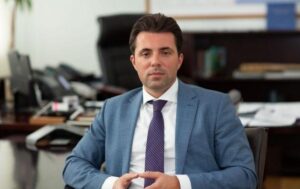
The situation in the Ukrainian energy system next week will be perceptibly more difficult compared to the current week, said the Chairman of the Board of the NEC Ukrenergo Volodymyr Kudrytskyy.
“Next week will be more difficult for the energy system, because the heat wave will return and we will have a reduced capacity of nuclear power plants, if compared to the current week,” he said in an interview with Ukrayinska Pravda on Friday.
According to the NEC head, due to the massive shelling, the energy system has lost its reserve of strength and has become dependent on sudden changes in electricity consumption and weather, forcing it to balance by shutting down consumers.
“Our energy system, having lost more than 9 GW of capacity due to shelling, now has no reserve of strength. If earlier we had additional power plants that could be switched on promptly, we would overlap by switching on some hydro units or TPP units, now we simply do not have such a maneuver,” – explained Kudrytskyy.”
As previously reported, Energoatom announced that it would put a 1000 MW nuclear power plant unit under repair as part of a planned repair campaign in 2024. The company pointed out that, given this and the increase in electricity consumption in July, the generation deficit in the power system may increase.
Prime Minister Denys Shmygal noted that saving e/e will be part of Ukraine’s daily life in the coming years due to Russian attacks on the country’s energy sector.

Due to weather conditions as of Wednesday morning 237 settlements in Zhytomyr, Kyiv, Sumy, Khmelnytskyi, Cherkasy, Chernihiv regions and Kyiv remain without power supply, another 490 settlements are without power due to other reasons, including military operations, NEC Ukrenergo reported in Telegram.
According to the Ministry of Energy, the most settlements – 117 – without light in Kyiv region, another 46 – in Chernihiv region, 42 – in Khmelnytskyi, 14 – in Cherkasy, 13 – in Zhytomyr region and 5 – in Sumy region. In total, according to his information, without light 38 thousand subscribers.
According to Ukrenergo, the process of connecting consumers in Sumy region, where one of the energy facilities was damaged during a night drone attack, is ongoing. According to the Ministry of Energy, the Russian Federation attacked by drones a substation of the oblenergo in the border territory of Sumy region, as a result of which 1,016 subscribers in 14 settlements were de-energized.
At the same time, as Ukrenergo notes, it managed to promptly restore power supply to consumers in Kherson, who were de-energized due to the shutdown of several power facilities in the region during the air alert. Damage to buildings and equipment of one of them was discovered during the inspection.
In general, there is still a deficit in the energy system, as a result of which hourly shutdown schedules, as announced earlier, will be applied from 15:00 to 23:00.
At the same time, a record volume of imports from Romania, Slovakia, Poland, Hungary, Moldova is scheduled for today – 29,796 MWh with a maximum capacity in some hours up to 1,689 MW, which corresponds to the maximum possible value. The last record was recorded on Saturday – 29,100 MWh.
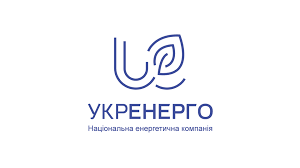
NEC “Ukrenergo” plans to apply schedules of hourly shutdowns all day Thursday.
As noted by the system operator in its Facebook on Wednesday evening, this is due to the expected cloudiness for tomorrow, which will reduce the production of electricity by solar plants.
It also clarifies that the GGOs concern both the population and industry.
As reported, today GPOs apply from 19:00 until the end of the day.
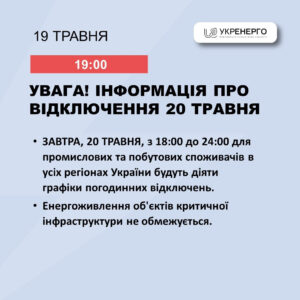
Hourly shutdown schedules will be introduced for all regions of Ukraine from 18:00 Monday until midnight Tuesday, Ukrenergo said.
“Tomorrow, May 20, from 18:00 to 24:00 for industrial and household consumers in all regions of Ukraine will operate schedules of hourly shutdowns,” – said in a message in the Telegram channel.
Power supply to critical infrastructure facilities will not be limited, the agency added.
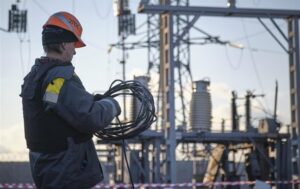
Controlled power supply restrictions for industrial consumers (power limitation schedules) will be applied from 18:00 to 22:00 on Wednesday, the press service of NPC Ukrenergo reports.
According to the press service, consumption restrictions for business and industrial enterprises will be evenly distributed in all regions of Ukraine.
At the same time, the power supply to critical infrastructure facilities and defense companies will not be limited.
“The need to limit energy supply is a consequence of Russian massive missile and drone attacks on Ukrainian power plants. Due to the deteriorating weather conditions in Ukraine, electricity consumption has increased significantly. The power system remains short of capacity,” explained NPC.
“We ask all consumers to consume electricity sparingly. And industry and business to use electricity imports and alternative power sources as much as possible,” the company added.
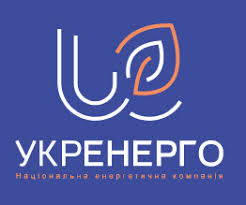
NPC Ukrenergo has announced a competition for the vacant position of a member of the Management Board, documents for which can be submitted by 18:00 on April 8, 2024.
According to the announcement on the company’s website, the main requirements are: higher education; at least five years of strategic and managerial leadership experience in international development, business development, operations and/or program management in large companies.
The candidate must also have a deep understanding of the national and European electricity markets, trends and prospects of the industry, and the specifics of the ENTSO-E transmission system operators.
In addition, a potential Board member should have competence in at least one of the following areas: business strategy and development, regulatory issues, legal support, finance and audit.
In case of equally developed skills, preference will be given to a candidate with experience at the executive level in the transmission system operators of ENTSO-E members.
As reported, the Board of Ukrenergo consists of Volodymyr Kudrytskyi (Chairman), Oleksii Brekht (Operation and Development of Grids), Serhii Halahan (IT) and Oleh Skrypnyk (Finance).
At the end of January 2024, Maryna Bezrukova, a former member of the NPC’s Management Board, became the head of the Defense Procurement Agency of the Ministry of Defense of Ukraine.